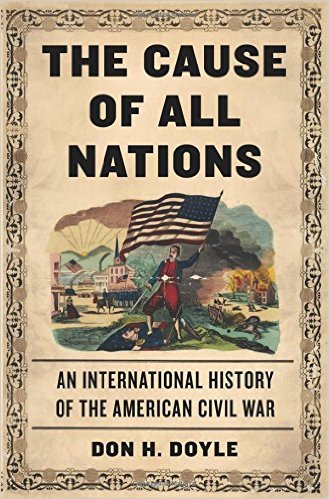
No period of our history has had more books written about it than the Civil War. However, the diplomatic struggle and international part of this fight has not been written about. That gap in our historic record has been magnificently filled by Dan Doyle’s The Cause of All Nations (2015, Basic Books).
While not a history of battles and heroic generals this topic makes for anything but a dry or uneventful read. It is a page turner and covers a previously uncovered chapter in our nation’s struggle against secession and slavery.
For the slave-holding Confederacy, the ability to gain international recognition was a struggle for survival. The Union, on the other hand, had to block recognition of the Confederacy if the Union was to survive.
Confederate Secretary of State Judah Benjamin is quoted as stating that the Confederacy would either “win the war peacefully overseas or lose it by arms at home!”
It was a contest at which the arrogant slaveowners proved to be woefully short of skills.
After the slave owning South seceded and then attacked Fort Sumter, forcing civil war, both sides began lobbying European people and leaders, attempting to win recognition and support for their cause. In 1861, the old European ruling classes, monarchists, political conservatives and colonialists held strong sympathy for the Confederacy.
A general hope among the old rulers was that the Union, the “experiment in democracy,” according to Lincoln, would receive its comeuppance and America would return to the natural order of rule by monarchs and oligarchs.
Across Europe, old rulers had returned to power when revolutions in Germany (1848), Italy and the Communard uprisings were beaten back. They saw comrades in the Confederate slaveholders and hoped a Confederate victory would likewise spell doom for their home-grown democratic movements.
Initially Confederate diplomats were optimistic, writing home in one case: “Our cause has great support here! Everyone supports our struggle except for the nobodies!”
Unfortunately for the Confederates, they were soon to learn that it is truly the “nobodies,” when mobilized, that make history!
While dueling diplomats from the Union and Confederacy tried to gain official support for their side, the old rulers were plotting to throw support to the South. The reactionary Napoleon III wanted to recolonize, first Mexico, then all of Latin America. He’d sent a large invading army to Mexico to overthrow the Juarez government and then lift the Union blockade of the South. He formed an uneasy alliance with the autocratic Bismarck in Germany and the conservative Palmerston administration in Britain. Most reactionary of all was Pope Pius, who was kept in power only by 20,000 occupying French troops.
This alliance had reached a secret agreement to call for “peace” in America, then to intervene in favor of the Confederacy, giving them official recognition and breaking the Union blockade.
These reactionary old rulers did not count on the intervention of the people of Europe and Mexico in their well-laid schemes. The people held very strong anti-slavery and democratic sentiments and they acted on them. Taking the ruling classes by surprise, revered Italian revolutionary Giuseppe Garibaldi organized a massive march on Rome for a democratic, united Italy and in solidarity with the American Union and the fight to end slavery.
Garibaldi was wounded and a massive all-European solidarity movement emerged. In Britain, Karl Marx and his supporters helped the young trade union movement organize a series of huge, militant demonstrations opposing any recognition of the Confederacy. France and Germany both also saw large solidarity demonstrations.
Mexico, meanwhile, saw a people’s army defeat Napoleon’s army at the Battle of Puebla. A holiday, Cinco de Mayo, celebrates this people’s victory.
The Battle of Antietam saw the Union army turn back Lee’s invading Confederates, with massive losses. Lincoln then issued the Emancipation Proclamation, changing the nature of the war to one clearly for emancipation of the enslaved peoples.
The schemes of the oligarchs and their alliance collapsed. Only the arch reactionary Pope Pius stayed on target, mobilizing the Catholic Church against the Union. This had a negative impact, especially on the Irish, even though Irish rebel Thomas Meagher led the heroic Irish Brigade for the Union and nearly 40 percent of Union troops were immigrants, mainly Irish and German.
Doyle goes on to explain how the people of Europe and Latin America, beaten down and under attack, developed a new, growing revolutionary movement and found a variety of ways to stand in solidarity with Unionists, against slavery.
He closes it out describing the Union victory ended slavery in the U.S. and how it intertwined with a growing worldwide democratic revolutionary movement. The Mexican people overthrew, then executed, Napoleon’s stooge, Maximillian and established a revolutionary government under Juarez. This shook France at its core, opening the way for a new revolutionary movement, which overthrew Napoleon and established the Fourth Republic. The conservative administration in Britain also went down to defeat and Garibaldi’s revolutionary movement won in Italy.
The Cause of All Nations is a tremendous addition to our historic record, helping readers see the previously hidden international ties between our struggles for democracy, against racism and slavery, and for freedom!









Comments